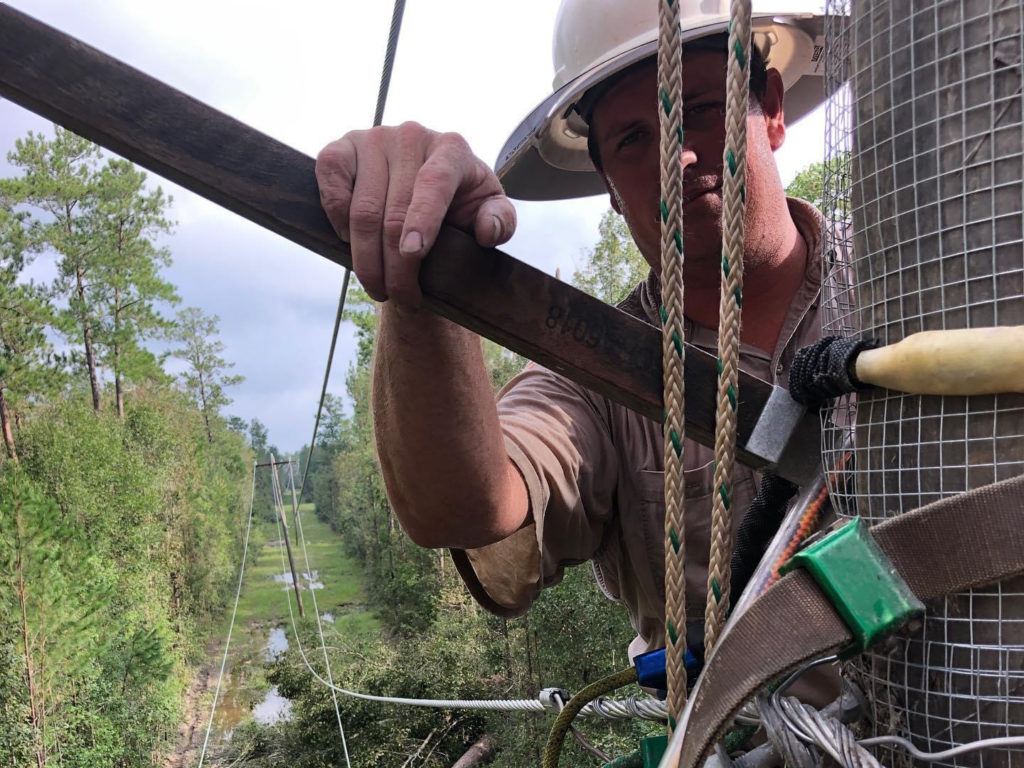Updated: Sept. 10, 3 p.m. ET
Two Louisiana electric cooperatives are still rebuilding their distribution systems two weeks after Hurricane Laura ripped through their service territories, and although electricity has been restored for many consumers, some still face weeks without power.
“We’re used to hurricanes, but this is the worst storm that we’ve seen in Louisiana, and hopefully will be the worst we ever see in our lifetimes,” said Jeffrey Arnold, CEO of the Association of Louisiana Electric Cooperatives. “We cannot give co-op members an estimate of time other than ‘weeks’ at this moment because of the number of transmission poles and towers that are down and the time and effort it will take to rebuild the power grid.”
Laura knocked out electricity to more than 1 million people after making landfall Aug. 27. Rebuilding transmission in parts of Louisiana could take a month, industry experts say. The storm caused massive damage to transmission structures, including various classes of wooden poles and steel towers, raising concerns about the availability of replacement parts to meet demand.
Representatives of the Western Area Power Administration and the American Public Power Association have been checking inventories for parts and equipment that could be released to help meet needs until additional supplies can be secured.
“In partnership with transmission system owners, the combined electric sector workforce is working determinedly to restore power as safely and quickly as possible,” said NRECA CEO Jim Matheson. “That will require creativity, communication and a continued focus on our crews’ health and wellness in the coming weeks amid the ongoing COVID-19 pandemic.”
Transmission problems across south and central Louisiana continue to cause problems for both co-op members and customers of investor-owned utilities. Since those IOUs control transmission lines serving the region, co-op crews have focused almost exclusively on distribution lines, leaving transmission repairs to the IOUs and their contractors.
Entergy reported outages affecting 84,000 meters on its lines in the Lake Charles area Thursday. Southwest Electric Power Co., a Shreveport-based subsidiary of investor-owned American Electric Power, has about 2,500 meters still out after restoring service to 133,000 customers.
Central Louisiana Electric Co., a regional IOU, has restored service to about 96% of its 140,000 customers who lost power as a result of Laura. But repairs continue in Beauregard, Jefferson Davis and Calcasieu parishes, where substantial numbers of co-op members remain without electricity.
Beauregard Electric Cooperative has restored power to about 11,000 of its 43,000 meters. With 12 of the Deridder-based co-op’s 22 substations energized, crews are repairing circuit lines in every area of their service territory.
“Our outage numbers continue to drop every day,” said General Manager Kevin Turner, adding that crews will soon start concentrating on restoring connections to individual homes. “We want to reassure our members that we are working as quickly and as safely as we can.”

Jeff Davis Electric Cooperative has restored service to about 4,400 of its nearly 11,000 meters. Despite limited access to energized transmission, work to rebuild distribution lines has continued since initial damage assessments were completed. Five of the Jennings-based co-op’s substations have been energized.
The co-op hopes to energize two additional substations with 5-megawatt mobile generators as early as Friday, said Michael Heinen, Jeff Davis EC’s general manager, adding that two communities in Jefferson Davis Parish will benefit. “We hope to restore power to those locations over this coming weekend.”
Homer-based Claiborne EC, located near the Arkansas state line, completed restoration work Sunday night, but local crews and contractors will be busy making permanent repairs and conducting cleanup operations for weeks. The storm still packed Category 1 strength winds of 75 to 90 mph when it pushed north into the co-op’s service territory.
“We have not seen damage like this in at least three decades, and our employees stepped up to the challenge tremendously,” Claiborne EC officials wrote in a Sept. 6 statement.
“Our next big effort will be to monitor every mile of line we serve in the coming weeks, looking for trees or other materials that were weakened by the hurricane, but still standing. We want to take care of as many of those as we can before we see other weather conditions that would cause these weakened trees and structures to fall on our lines.”
The hardest-hit co-ops have received help from hundreds of co-op crews from 13 states who began arriving in the hours before the storm made landfall. Visiting crews are staying in camps designed to address COVID-19 concerns, with precautions that include special air filters capable of removing 99.4% of the virus installed on the HVAC equipment and beds spread out to maintain social distancing. Shower facilities are also being sanitized after every use, and meals are served in separate containers and eaten apart from others.
After two weeks of working long hours in hot and humid weather, some crews have returned home and been replaced by fresh crews, who hauled in more parts and equipment to continue restoration work where it’s still needed.
Because co-ops are staffed by people who live in the communities they serve, at least 30 families of co-op employees are coping with the total loss or major damage to their homes. “Our co-ops have been able to put those families up in hotels to help keep them safe and comfortable while their spouses go about the business of getting power back on,” said Arnold.
The statewide association has established a fund to assist them with their recovery and help address their long-term issues. Those who wish to contribute can contact ALEC at 225-293-3450 or send donations to ALEC Hurricane Relief Fund, care of ALEC, 10725 Airline Highway, Baton Rouge, LA 70816-4213.
Derrill Holly is a staff writer at NRECA.
Read More:
• In Hurricane Aftermath, Pregnant Co-op Employees Press On as Due Dates Approach
• Q&A: Louisiana Co-op Leader Gives Firsthand Perspective on Restoration
• Social Media Roundup: See the Co-ops Response to the Storm